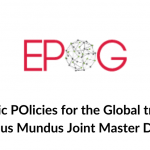Economic Policies for the Global transition (EPOG+) | Consortium
EPOG+ is an Erasmus Mundus Joint Master Degree. It offers a world-class integrated Master’s programme on the (digital, socioeconomic, ecological) transition processes with a pluralist approach and interdisciplinary perspectives. It involves more than 40 partners in Europe and the world.
How does the programme provide content to ensure students achieve an understanding of a reasonably diverse set of perspectives on understanding economies?
- (i) a state-of-the-art knowledge and expertise in one of the main fields of economic policy (related to Majors A, B and C) and within a common perspective (institutional and interdisciplinary approaches to globalisation);
- (ii) an in-depth “systemic” understanding of the interactions among economic policies (related to the two courses and the joint seminars provided to entire cohort);
- (iii) the unique corresponding skills and competences, in particular, the ability to deal with the complex and systemic interactions among economic policies and to work in an international and cosmopolitan context.
How does the programme ensure students understand the interaction between economic and ecological systems?
How does the programme ensure students understand how to critically explore real-world evidence, both qualitative and quantitative?
What pedagogical approaches does the programme use to ensure that students examine the historical context, assumptions and values in all economic thinking?
The EPOG+ programme considers economics as a social science, in which history and social behaviours matter. In addition, the uniqueness of the EPOG+ programme relies on this “systemic/holistic” approach, i.e., the ability to offer each student a specific field of study related to the chosen Major (A- Knowledge, innovation and digital transition; B- Macroeconomics, finance and the socioeconomic transition; C- Development, sustainable development and the ecological transition), together with courses, seminars and activities related to the other Majors. By reconciling these two dimensions, graduates will be better prepared to address the related challenges and to bridge the academic and policy communities.
How does the department ensure that the teaching culture and capacity to deliver economic pluralism are continually improving?
The “EPOG+ joint assurance quality framework” complies with the highest standards in the field. It has been constructed based on exchanges with each partner to identify and compare best practices at the local level.
Other information:
The EPOG+ programme involveds 8 core partners:
- Université de technologie de Compiègne (Department of Technology and Human Sciences)
- Sorbonne University (Department of Socio-economics)
- Université de Paris (Department of Geography, History, Economics and Society)
- University of Turin (Department of Culture, Politics and Society)
- Berlin School of Economics and Law (Department of Business and Economics)
- University degli studi Roma Tre (Department of Business and Economics)
- Vienna University of Economics and Business (Department of Socioeconomics)
- University of the Witwatersrand (Faculty of Commerce, Law and Management).
- Aalborg University Business School
Country:
Various
University:
Consortium
Course name:
Economic Policies for the Global transition (EPOG+)
Department/school:
Course level:
Taught Masters
Course language:
English

 all programmes
all programmes